

Creating and Using Rubrics for Assessment. Tools and Ideas for Creating Your Rubrics Many of these rubrics grew out of a long-term commitment to building alternative assessments in our Instructional Design, and Math Specialist and Teaching and Assessing Writing online courses.
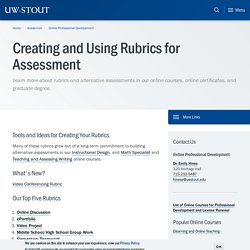
What's New? Video Conferencing Rubric Our Top Five Rubrics Quick Links to Rubrics Presentation Rubrics Video Conferencing Rubric Maggie Rouman's rubric assesses real-time sessions to foster community, present topics, and enhance learning. Podcast Rubric Ann Bell's rubric helps students assess what makes a good podcast. PowerPoint Rubric 10 performance categories Oral Presentation Rubric (Word doc) VoiceThread Participation Rubric (pdf) Michelle Pacansky-Brock's general formative assessment is used when students view a mini video lecture/presentation. Oral Presentation Checklist 4Teachers.org provides an online tool to customize the checklist for your grade level Effective Project Presentations Buck Institute for Education (BIE) rubric for high school presentations. Take a Virtual Tour of Shakespeare's Globe Theatre in London. The story of the Globe Theatre, the ancestral home of Shakespeare’s plays, is itself very Shakespearean, in all of the ways we use that adjective: it has deep roots in English history, a tragic backstory, and represents all of the hodgepodge of London, in the early 17th century and today, with the city’s colorful street life, mingling of international cultures, high and low, and its delight in the play and interplay of languages.
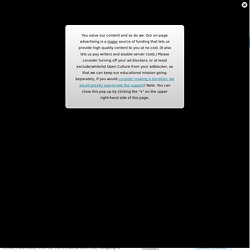
How Do You Teach to the Standards When Doing Project-Based Learning? The Seven Biggest Lies that Keep Teachers from Implementing Project-Based Learning. We know that kids learn at a deeper level when they do meaningful projects.
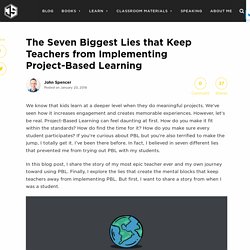
We’ve seen how it increases engagement and creates memorable experiences. However, let’s be real. Project-Based Learning can feel daunting at first. How do you make it fit within the standards? How do find the time for it? In this blog post, I share the story of my most epic teacher ever and my own journey toward using PBL. If you enjoy this blog but you’d like to listen to it on the go, just click on the audio below or subscribe via iTunes/Apple Podcasts (ideal for iOS users) or Google Play and Stitcher (ideal for Android users) The Art of Reflection. 12 Tools To Find Quality Reading Passages For Your Classroom - 8 minutes read 12 Tools To Find Quality Reading Passages For Your Classroom contributed by Lisa Tanner Are you preparing your students to succeed in this high-tech world?
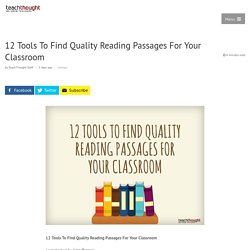
As more media moves to the internet, digital literacy is an essential skill. Copyright Lessons for Students and Teachers. Shifting Your Assessments To Grow Higher-Level Thinking - TeachThought PD. Shifting Your Assessments To Grow Higher-Level Thinking.
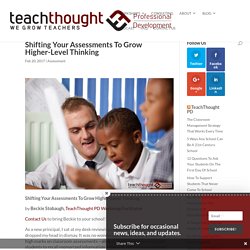
12 Strategies For Teaching Literature In The 21st Century - 12 Strategies For Teaching Literature In The 21st Century. To Test Your Fake News Judgment, Play This Game : NPR Ed. Fake news has been on Maggie Farley's mind further back than 2016 when President Trump brought the term into the vernacular.
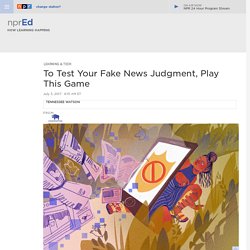
Farley, a veteran journalist, says we've had fake news forever and that "people have always been trying to manipulate information for their own ends," but she calls what we're seeing now "Fake news with a capital F. " In other words, extreme in its ambition for financial gain or political power. "Before, the biggest concern was, 'Are people being confused by opinion; are people being tricked by spin? ' " Now, Farley says, the stakes are much higher. So one day she says an idea came to her: build a game to test users' ability to detect fake news from real. How to spot a misleading graph - Lea Gaslowitz.
What makes a poem … a poem? - Melissa Kovacs. Eliminate Assessment Fog. A Great Explanation of Primary Sources vs. Secondary Sources. The 6 Online Research Skills Your Students Need. 1.
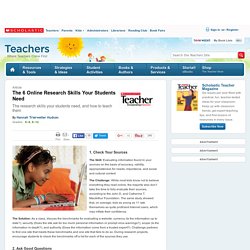
Check Your Sources The Skill: Evaluating information found in your sources on the basis of accuracy, validity, appropriateness for needs, importance, and social and cultural context The Challenge: While most kids know not to believe everything they read online, the majority also don’t take the time to fully evaluate their sources, according to the John D. and Catherine T.
MacArthur Foundation. The same study showed that, on average, kids as young as 11 rate themselves as quite proficient Internet users, which may inflate their confidence. ReadWorks Offers a Nice Set of Poems and Guiding Questions for Poetry Month. ReadWorks is one of my favorite nonprofit services for teachers.
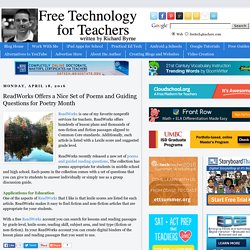
ReadWorks offers hundreds of lesson plans and thousands of non-fiction and fiction passages aligned to Common Core standards. Additionally, each article is listed with a Lexile score and suggested grade level. ReadWorks recently released a new set of poems and guided reading questions. What’s Changed in Harper Lee’s Hometown Since ‘Mockingbird’ A local theater production of “To Kill a Mockingbird,” performed for schoolchildren in the Monroe County Heritage Museum in Monroeville, Ala., in 2015.
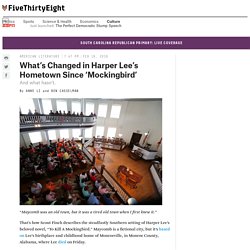
Sharon Steinmann / AP “Maycomb was an old town, but it was a tired old town when I first knew it.” That’s how Scout Finch describes the steadfastly Southern setting of Harper Lee’s beloved novel, “To Kill A Mockingbird.” Maycomb is a fictional city, but it’s based on Lee’s birthplace and childhood home of Monroeville, in Monroe County, Alabama, where Lee died on Friday. Monroe County was the perfect model for the setting of the Depression-era novel. Eighty-four years later, Monroe County has become smaller, whiter and richer, but the racial disparities Lee illustrated in her book still exist.
Overall, Monroe County is still poor, with a 29.2 percent poverty rate and a 41.2 percent child poverty rate, both well above the rate for the U.S. overall. The racial income gap appears to have narrowed but remains wide. Teacher Professional Development is Broken, 3 Steps to Fix It. Many teachers feel like teacher professional development is a waste.
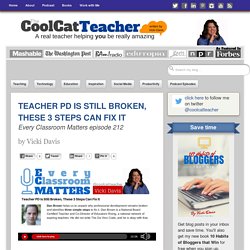
3 Simple Steps to Help Students Become a Global Citizen. Like squirrels in a sack, we can choose to coexist or we can make life miserable for one another. We are all a global citizen whether we realize it or not. Parents and teachers are building the bridges today that tomorrow will walk across. Let’s be clear about something. Because of the way students form their opinions, if you’re not building a bridge, you’re building a wall. There is no middle ground here. Have a Big Mind. Standards. Standards Welcome to the Michigan Academic Standards Page! According to the dictionary, a standard is “something considered by an authority or by general consent as a basis of comparison”.
Today’s world is replete with standards documents such as standards of care, standards of quality, and even standard operating procedures. These various sets of standards serve to outline agreed-upon expectations, rules, or actions which guide practice and provide a platform for evaluating or comparing these practices. The state academic standards posted here serve to outline learning expectations for Michigan’s students and are intended to guide local curriculum development. Modern Professional Learning: Connecting PLCs With PLNs. Great teaching knowledge dies every day. It retires. It leaves. Perhaps the secret of saving this knowledge lies in a unique melding of two professional learning practices that teachers use today: the professional learning community (PLC) and the professional learning network (PLN).
Someone must pass along the knowledge. Someone must "build the craft. " The same is true today. The Professional Learning Community.